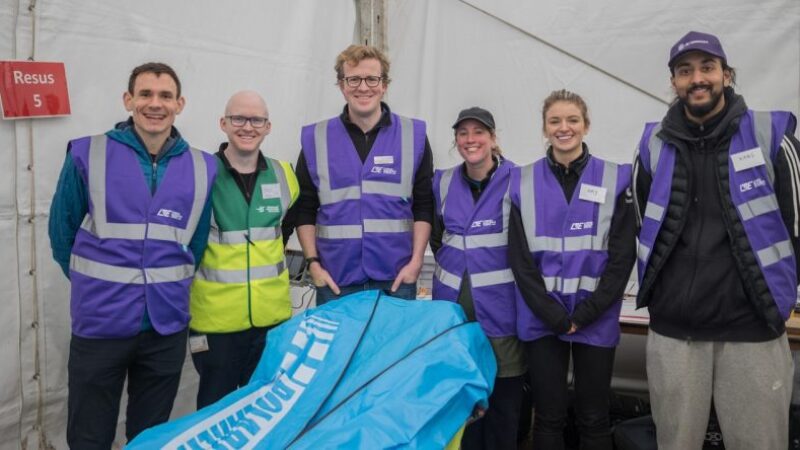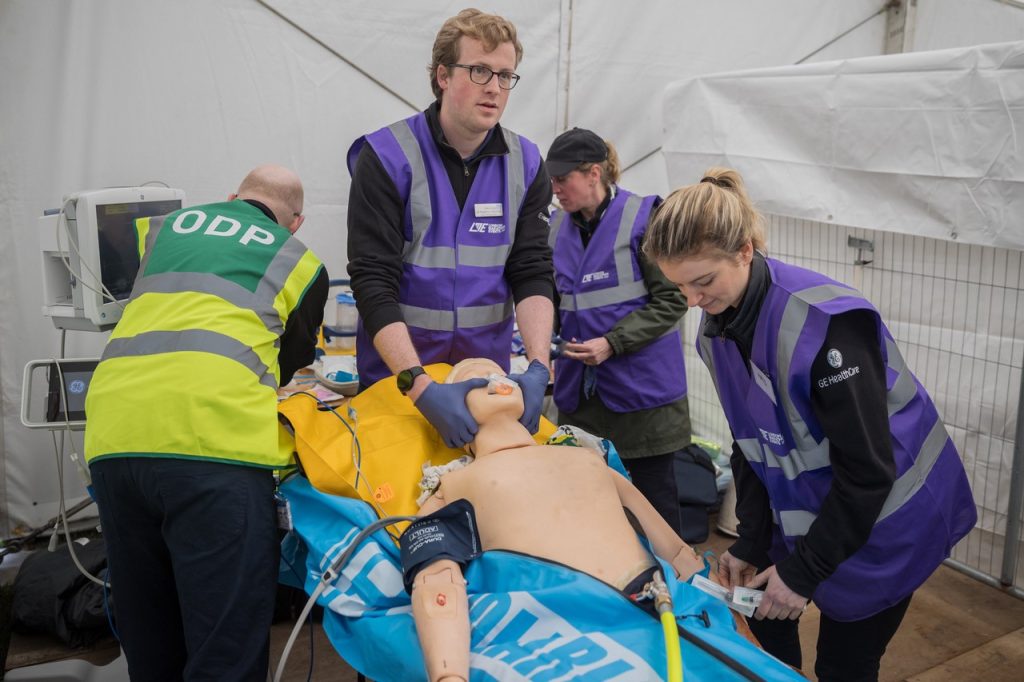
Colleagues from UHSussex were involved in treating a runner at Brighton Marathon with pioneering new cold-water treatment.
When Onder Mengi suffered heat stroke complications as he approached the finish line of the Brighton Marathon, he was helped by the specialist medical team using an innovative cold-water immersion method, developed by the military.
Dr Todd Leckie, University Hospitals Sussex Anaesthetics Doctoral Fellow, co-led the cold-water immersion medical team, which included UHSussex colleagues Dr Freddie Stourton, Anaesthetist, and Dr Luke Hodgson, Intensive Care Consultant.

Mr Mengi, 44 from Essex, had almost completed his first 26.2-mile marathon, but recalls the last two miles being a struggle and instead of slowing down, he sped up. As the finish line came into view, he collapsed.
Two fellow runners picked him up to help him cross the line where his family were cheering from the side-lines, but Onder’s legs stopped working and he became unconscious.
The father of three quickly deteriorated and was rushed to the nearby on-site medical unit, where a large volunteer team of doctors, paramedics, and nurses work in conjunction with the St John Ambulance Team.
Although weather conditions were relatively cool that day, overexertion caused Onder to have a temperature of 41.9c.
Typically, 10 to 20 runners experience some degree of heat illness and receive medical care at Brighton Marathon each year. Of these, 20-25% can have severe heat stroke and become seriously unwell. In Onder’s case he was in and out of consciousness, as excessive heat was impairing his brain function.
A side effect of extreme hyperthermia, brought on by intense physical activity, can cause an individual to develop a sensation of euphoria, enabling them to continue to push themselves despite their temperature rising to dangerous levels.
On hand, the specialist team implemented the cold-water immersion method, which involved placing Onder into a pod filled with ice cold-water to bring his temperature down quickly.
Onder recalls: “It was a scary experience. They cut my clothes and put me in the bag of freezing cold-water. My legs were really cramping, and my fingers and toes went numb. I couldn’t feel anything. The doctors said I was seriously ill, and I started to think whether I was going to be like this for the rest of my life. All these things were going through my head.”
Without quick intervention and rapid cooling, people can deteriorate further or sustain more significant organ damage.
Dr Leckie said: “The cooling of Onder was highly effective and we achieved a drop of three degrees Celsius in 20 minutes. For Onder in particular, this was an exceptional cooling rate that we would not have achieved with standard cooling strategies of iced towels, water, and fans.”
The cold-water immersion technique was developed by the military to treat heat casualties, including during training exercises.

The Brighton Marathon Medical Team adopted the technique as a better way to treat cases of severe heat stroke and created a specific team to deliver it.
Dr Leckie co-led the team with Lt Col Mike Stacey, Consultant Physician in the Defence Medical Service.
Lt Col Mike Stacey said: “We believe this is the first use of the pod at an event of Brighton’s standing in the UK and were pleased with the results and the way it was translated into the civilian medical tent environment.”
Onder’s fiancée, Andrea Boylin, along with two of their children, witnessed Onder collapse, and credits the team of medics and innovative equipment for his recovery.
She said: “It’s just vital we have something like this at marathons. It saved his life. The doctors were just amazing, I gave one a hug at the end. He was amazing with him. He’s here today because of them.”
Onder was treated and monitored for four hours and could go straight home, avoiding hospital admission.
Following on from his medical emergency, Onder is doing well and taking it easy. Having visited his local hospital for routine tests, he has almost returned to his normal self and has been given the all clear to run future marathons.
Onder said: “I can’t thank the medical team enough, just for how brilliant a job they did. I really appreciate their hard work, they did brilliantly. I can’t even find the words for how good they were. The equipment used was out of this this world.”
Dr Leckie and colleagues aim to encourage other events to provide cold-water immersion treatment.
He said: “I think it’s vital that we have effective methods to recognise and manage exertional hyperthermia. In my experience, cold-water immersion is the best way to cool these patients and I’m keen to share the expertise that has developed within the Brighton Marathon Medical Team and promote its use.”